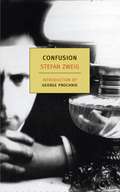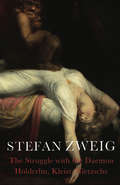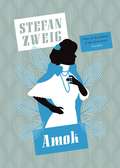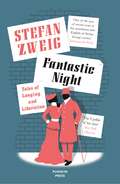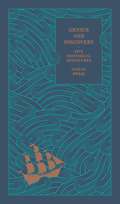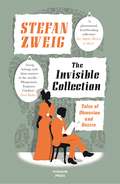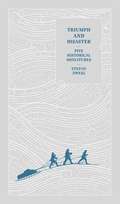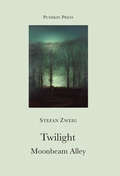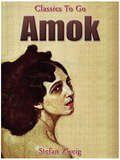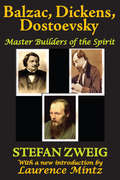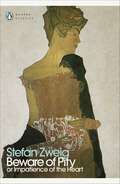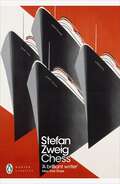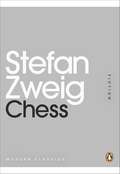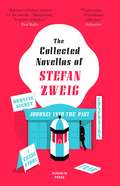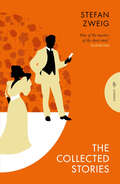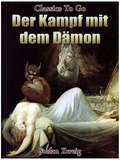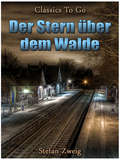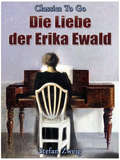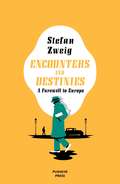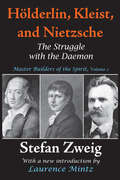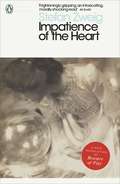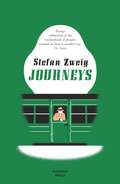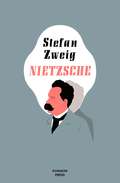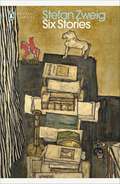- Table View
- List View
Confusion
by Stefan Zweig George Prochnik Anthea BellA young man who is rapidly going to the dogs in Berlin is packed off by his father to a university in a sleepy provincial town. There a brilliant lecture awakens in him a wild passion for learning--as well as a peculiarly intense fascination with the graying professor who gave the talk. The student grows close to the professor, becoming a regular visitor to the apartment he shares with his much younger wife. He takes it upon himself to urge his teacher to finish the great work of scholarship that he has been laboring at for years and even offers to help him in any way he can. The professor welcomes the young man's attentions, at least on some days. On others, he rages without apparent reason or turns away from his disciple with cold scorn. The young man is baffled, wounded. He cannot understand. But the wife understands. She understands perfectly. And one way or another she will help him to understand too.
The Struggle with the Daemon
by Stefan Zweig Cedar Paul Eden PaulThe Struggle with the Daemon is a brilliant analysis of the European psyche by the great novelist and biographer Stefan Zweig. Zweig studies three giants of German literature and thought: Friedrich Ho¨lderlin, Heinrich von Kleist and Friedrich Nietzsche - powerful minds whose ideas were at odds with the scientific positivism of their age; troubled spirits whose intoxicating passions drove them mad but inspired them to great works. In their struggle with their inner creative force, Zweig reflects the conflict at the heart of the European soul - between science and art, reason and inspiration.Both highly personal and philosophically wide-ranging, this is one of the most fascinating of Zweig's renowned biographical studies.From the Trade Paperback edition.
Amok (Classics To Go)
by Stefan Zweig Anthea BellA new pocket edition of this Conradian tale of maddening desire, from the master of the novellaOn a sweltering ocean-liner travelling from India to Europe a passenger tells his story: the tale of a doctor in the Dutch East Indies torn between his duty and the pull of his emotions; a tale of power and desire, pride and shame and a headlong flight into folly.This is one the most intense and incisive of the novellas which brought Stefan Zweig to worldwide fame.
Fantastic Night
by Stefan Zweig Anthea Bell'I alone know that I am only just beginning to live.'He is distinguished, rich, a member of fashionable society-utterlybored. But, over the course of one fantastic night, a young Baron becomes a thief, unashamed, and awakes to life for the first time.This collection is full of tales of infinite passions, of intense encounters that transform lives, a knock on a door that forces a whole community to take flight, a doomed attempt to save a soul poisoned by addiction, a love soured into awful cruelty, of longing and liberation. They are the gripping work of a master storyteller, unmatched and completely unforgettable.
Genius and Discovery: Five Historical Miniatures
by Stefan Zweig Anthea BellOne of two beautifully designed hardback gift editions of Stefan Zweig's breathlessly dramatic historical sketches, out in time for the holidays.Millions of people in a nation are necessary for a single genius to arise, millions of tedious hours must pass before a truly historic shooting star of humanity appears in the sky.Five vivid dramatizations of some of the most pivotal episodes in human history, from the Discovery of the Pacific to the composition of the Marseillaise, bringing the past to life in brilliant technicolor.Included in this collection:"Flight into Immortality": Vasco Núñez de Balboa's quest to be the first European to see the Pacific Ocean. "The Resurrection of George Frederic Handel": Handel falls into depression until a poet sends him an inspirational work."The Genius of a Night": Captain Rouget writes La Marseillaise, the song which is to become the French national anthem."The Discovery of El Dorado": John Sutter founds New Helvetia in western America and attempts to keep it."The First Word to Cross the Ocean": Cyrus W. Field resolves to lay the first trans-Atlantic telegraph cable.
The Invisible Collection
by Stefan Zweig Anthea BellThis is the story of about the strangest thing that I've ever encountered, old art dealer that I am.'It is perhaps the finest art collection of its kind, acquired through a lifetime of sacrifice - but when a dealer comes to see it, he finds something quite unexpected, and is drawn into a peculiar deception of the collector himself...Stefan Zweig was a wildly popular writer of compelling short fiction: in this collection there are peaks of extraordinary emotion, stories of all that is human crushed by the movements of history, of letters that fill a young heart or drive a person towards death, of obsession and desire. They will stay with the reader for ever.
Triumph and Disaster: Five Historical Miniatures
by Stefan Zweig Anthea BellOne of two beautifully designed hardback gift editions of Stefan Zweig's breathlessly dramatic historical sketches, out in time for Christmas.A single Yes, a single No, a Too Soon or a Too Late makes that hour irrevocable for hundreds of generations while deciding the life of a single man or woman, of a nation, even the destiny of all humanity.Five vivid dramatizations of some of the most pivotal episodes in human history, from the Fall of Constantinople to Scott's doomed attempt to reach the South Pole, bringing the past to life in brilliant technicolor.Included in this collection:"The Field of Waterloo": A fascinating little known story of Napoleon's defeat."The Race to Reach the South Pole": The failed expedition of the English to discover the South Pole first."The Conquest of Byzantium": Sultan Mahomet's defeat of Byzantium through a neglected door."The Sealed Train": Lenin's triumphant return from exile."Wilson's Failure": The Treaty of Versailles is signed.
Twilight and Moonbeam Alley
by Stefan Zweig Anthea BellTwilight is the story of a fashionable lady who is banished from Versailles by the king. She tries to make the best of living on her country estate, but although she entertains lovers and friends from Paris, she comes to find it intolerable. Life at court, for all its essential emptiness, was the only thing that gave her existence meaning, and she moves inexorably towards suicide. In Moonbeam Alley, a traveller delayed in a French port explores the sailors' quarter. Enticed by a voice singing an aria, to a bar near the harbour, he learns the story of those who run it and frequent it: a tale of violence, unrequited passion, and a marriage that is no true marriage.From the Trade Paperback edition.
Amok (Classics To Go)
by Stefan ZweigIn der Rahmenhandlung reist der namenlose Ich-Erzähler im Jahre 1912 mit dem Überseedampfer Oceania von Indonesien nach Europa. Bei einem nächtlichen Spaziergang auf dem Deck begegnet er einem Mann, der sichtlich verwirrt und ängstlich wirkt und jede Gesellschaft auf dem Schiff meidet. Eine Nacht darauf trifft der Ich-Erzähler diesen Mann erneut auf dem Deck an. Anfangs verlegen, vertraut dieser sich ihm an und erzählt seine Geschichte – die eigentliche Handlung der Novelle. (Auszug aus Wikipedia)
Balzac, Dickens, Dostoevsky: Master Builders of the Spirit
by Stefan ZweigWritten over a period of twenty-five years, this first volume in a trilogy is intended to depict in the life and work of writers of different nationalities--Balzac, Dickens, and Dostoevsky--the world-portraying novelist. Though these essays were composed at fairly long intervals, their essential uniformity has prompted Zweig to bring these three great novelists of the nineteenth century together; to show them as writers who, for the very reason that they contrast with each other, also complete one another in ways which makes them round our concept of the epic portrayers of the world.Zweig considers Balzac, Dickens, and Dostoevsky the supremely great novelists of the nineteenth century. He draws between the writer of one outstanding novel, and what he terms a true novelist--an epic master, the creator of an almost unending series of pre-eminent romances. The novelist in this higher sense is endowed with encyclopedic genius, is a universal artist, who constructs a cosmos, peopling it with types of his own making, giving it laws of gravity that are unique to these fi gures.Each of the novelists featured in Zweig's book has created his own sphere: Balzac, the world of society; Dickens, the world of the family; Dostoevsky, the world of the One and of the All. A comparison of these spheres serves to prove their diff erences. Zweig does not put a valuation on the differences, or emphasize the national element in the artist, whether in a spirit of sympathy or antipathy. Every great creator is a unity in himself, with its own boundaries and specifi c gravity. There is only one specifi c gravity possible within a single work, and no absolute criterion in the sales of justice. This is the measure of Zweig, and the message of this book.
Beware of Pity
by Stefan Zweig'The most exciting book I have ever read ... a feverish, fascinating novel' Antony Beevor, Sunday Telegraph'I can't take any more of your revolting merciful kindness!'Who would have thought that the great military hero Captain Hofmiller - that living monument to his own courage - would have anything burdening his soul? But when he reveals his story, it is not one of bravery but tragedy: a simple blunder at a dance from which disaster grows, ruining lives with his weak, foolish pity...Beware of Pity is Stefan Zweig's greatest novel, fiercely capturing human emotions in all their subtleties and extremes - while Hofmiller, his unforgettable, naïve creation, misunderstands everything, resulting in his downfall.Translated by Jonathan Katz. Previously published as Impatience of the Heart.
Chess: A Novel (Penguin Modern Classics)
by Stefan Zweig'... a human being, an intellectual human being who constantly bends the entire force of his mind on the ridiculous task of forcing a wooden king into the corner of a wooden board, and does it without going mad!'A group of passengers on a cruise ship challenge the world chess champion to a match. At first, they crumble, until they are helped by whispered advice from a stranger in the crowd - a man who will risk everything to win. Stefan Zweig's acclaimed novella Chess is a disturbing, intensely dramatic depiction of obsession and the price of genius.
Chess: A Novel (Penguin Modern Classics)
by Stefan Zweig'... a human being, an intellectual human being who constantly bends the entire force of his mind on the ridiculous task of forcing a wooden king into the corner of a wooden board, and does it without going mad!'A group of passengers on a cruise ship challenge the world chess champion to a match. At first, they crumble, until they are helped by whispered advice from a stranger in the crowd - a man who will risk everything to win. Stefan Zweig's acclaimed novella Chess is a disturbing, intensely dramatic depiction of obsession and the price of genius.
The Collected Novellas of Stefan Zweig
by Stefan ZweigA casual introduction, a challenge to a simple game of chess, a lovers' reunion, a meaningless infidelity: from such small seeds Zweig brings forth five startlingly tense tales--meditations on the fragility of love, the limits of obsession, the combustibility of secrets and betrayal.To read anything by Zweig is to risk addiction; in this collection the power of his writing--which, with its unabashed intensity and narrative drive, made him one of the bestselling and most acclaimed authors in the world--is clear and irresistible. Each of these stories is a bolt of experience, unforgettable and unique.Five of Stefan Zweig's most powerful novellas, containing some of his most famous and best-loved work: • Burning Secret • A Chess Story • Fear • Confusion • Journey into the Past(Stand alone paperback editions of individual novellas from Pushkin and New York Review of Books will remain in print.)
The Collected Stories of Stefan Zweig
by Stefan Zweig22 classic short stories of love and death, betrayal and hope—from a master storyteller hailed as &“the Updike of his day&” (New York Observer).Collected in one volume for the very first time! In this magnificent collection of Stefan Zweig&’s short stories, the very best and worst of human nature is captured with sharp observation, understanding, and vivid empathy. Ranging from love and death to faith restored and hope regained, these stories present a master at work, at the top of his form. Perfectly paced and brimming with passion, these 22 tales from one of the great storytellers of the 20th century are translated by the award-winning Anthea Bell. Included: Forgotten Dreams In the Snow The Miracles of Life The Star Above the Forest A Summer Novella The Governess Twilight A Story Told in Twilight Wondrak Compulsion Moonbeam Alley Amok Fantastic Night Letter from an Unknown Woman The Invisible Collection Twenty-Four Hours in the Life of a Woman Downfall of the Heart Incident on Lake Geneva Mendel the Bibliophile Leporella Did He Do It? The Debt Paid Late
Der Kampf mit dem Dämon (Classics To Go)
by Stefan Zweig"Der Kampf mit dem Dämon" ist ein biographischer Essayband von Stefan Zweig. Die Erstausgabe dieses Werkes erschien 1925 im Insel-Verlag zu Leipzig. Obwohl das Buch damals eine Auflagehöhe von mehr als zwanzigtausend erreichte, findet sich in der heutigen Forschungsliteratur nur sehr wenig dazu. Es ist Stefan Zweigs einziger biographischer Essayband über deutsche Dichter und Denker. Sonst beschäftigt er sich in erster Linie mit den Dichtern französischer Sprache.
Der Stern über dem Walde (Classics To Go)
by Stefan Zweig"Der Stern über dem Walde" ist eine kurze Erzählung von Stefan Zweig. Die Hauptperson der Erzählung ist der im Rivierahotel arbeitende Kellner François. Beim Bedienen der Gräfin Ostrowska wird er innerlich verzaubert und spürt tiefe Verehrung für ihre Person. Mit einer treuen, begehrungslosen Liebe dient er ihr unbemerkt und saugt jeden ihrer Befehle auf um in ihrer Nähe zu sein. Als er jedoch vernehmen muss, dass die Gräfin mit dem Zug abreist, bricht das mit einem mal an Farbe gewonnene Leben von François zusammen. Nach anfänglichen Gedanken ihr nachzureisen, nimmt er sein weniges Geld, um damit einen ganz besonderen, letzten Blumenstrauß für seine Angebetete zu erstehen. Hiernach treiben ihn Todesgedanken umher, die ihn schließlich zum Gleis führen, auf dem der Zug der Gräfin Ostrowska entlangfahren wird. Mit einem einsamen Stern im Blick legt sich François auf die Schienen und lässt sein Leben durch den Zug, in dem seine Angebetete sitzt, beenden. (Auszug aus Wikipedia)
Die Liebe der Erika Ewald: Novellen - Primary Source Edition (Classics To Go)
by Stefan ZweigDie Pianistin Erika Ewald verliebt sich während der Proben für ein gemeinsames Konzert in einen Geigenvirtuosen. Während ihre Liebe zunächst eher platonischer Natur ist – sie erfreut sich an gemeinsamen Gesprächen und Spaziergängen –, wächst in ihm das Begehren für die junge Frau. Er gesteht ihr seine Gefühle, jedoch spürt sie, dass sie für diesen Schritt noch nicht bereit ist und flieht im letzten Moment. Es folgt eine unbestimmte Zeit des Wartens, in denen beide keinen Kontakt mehr haben. Indes beginnt Erika innerlich zu reifen und fühlt sich ebenfalls körperlich zu dem jungen Künstler hingezogen. Ihr ganzes Bestreben konzentriert sich jetzt auf ein Wiedersehen mit ihm, was ihr schließlich bei dem Besuch eines seiner Konzerte gelingt. Als sie jedoch mit ihm sprechen will, sieht sie ihn höhnisch lächelnd mit einer Opernsängerin im Arm weggehen. Nach anfänglichen Todesgedanken fasst sie den Entschluss, an ihm Rache zu üben, indem sie sich dem erstbesten Mann hingibt. Das Schicksal jedoch bewahrt sie vor diesem Schritt und lässt sie ihr Leid langsam ertragen. Sie weiß, dass sie nie wieder im Stande sein wird, einen anderen Menschen zu lieben, und führt ihr weiteres Leben in Enthaltsamkeit und berauschenden Gedanken an die Vergangenheit. (Auszug aus Wikipedia)
Encounters and Destinies: A Farewell to Europe
by Stefan ZweigA new collection of essays by Stefan Zweig: tributes to the great artists and thinkers of the Europe of his dayStefan Zweig was one of the twentieth century's greatest authors and a tireless champion of freedom, tolerance and friendship across borders. Encounters and Destinies collects his most impassioned and moving tributes to his many illustrious friends and peers: literary, philosophical and artistic luminaries from across the Old Europe that Zweig loved so much, and which he grieved to see so cruelly destroyed by two world wars.Including pieces on Rainer Maria Rilke, Marcel Proust, Sigmund Freud, Maxim Gorky and Arturo Toscanini, this essential collection is also Zweig's tribute to the ideal of friendship: an ideal he clung to as the world he knew was torn apart.
Holderlin, Kleist, and Nietzsche: The Struggle with the Daemon
by Stefan ZweigThis is the second volume in a trilogy in which Stefan Zweig builds a composite picture of the European mind through intellectual portraits selected from among its most representative and influential figures. In 'Hoelderlin, Kleist, and Nietzsche', Zweig concentrates on three giants of German literature to portray the artist and thinker as a figure possessed by a powerful inner vision at odds with the materialism and scientific positivism of his time, in this case, the nineteenth century. Zweig's subjects here are respectively a lyric poet, a dramatist and writer of novellas, and a philosopher. Each led an unstable life ending in madness and/or suicide and not until the twentieth century did each make their full impact. Whereas the nineteenth-century novel is socially capacious in terms of subject and audience, the three figures treated here are prophets or forerunners of modernist ideas of alienation and exile. Hoelderlin and Kleist consciously opposed the worldly harmoniousness of Goethe's classicism in favor of a visionary inwardness and dramatisation of the subjective psyche. Nietzsche set himself as a destroyer and rebuilder of philosophy and critic of the degradation of the German spirit through nationalism and militarism. Zweig's choice of subjects reflects a division in his own soul. The image of Goethe recurs here as the ultimate upholder of Zweig's own ideals: scientist and artist, receptive to world culture, supremely rational and prudent. Yet Zweig was aware that Hoelderlin, Kleist, and Nietzsche were more daring explorers of the dangerous and destructive aspects of man that needed to be seen and comprehended in the clarifying light of poetry and philosophy.
Impatience of the Heart (Penguin Modern Classics)
by Stefan ZweigThe great Austrian writer Stefan Zweig was a master anatomist of the deceitful heart, and Impatience of the Heart, the only novel he published during his lifetime, uncovers the seed of selfishness within even the finest of feelings.Hofmiller, an Austro-Hungarian cavalry officer stationed at the edge of the empire, is invited to a party at the home of a rich local landowner, a world away from the dreary routine of the barracks. The surroundings are glamorous, wine flows freely, and the exhilarated young Hofmiller asks his host's lovely daughter for a dance, only to discover that sickness has left her painfully crippled. It is a minor blunder that will destroy his life, as pity and guilt gradually implicate him in a well-meaning but tragically wrongheaded plot to restore the unhappy invalid to health.
Journeys (Modern Voices Ser.)
by Stefan ZweigA collection of the great writer's observations, made during his travels across the Europe he loved so muchWhen I am on a journey, all ties suddenly fall away. I feel myself quite unburdened, disconnected, free - There is something in it marvellously uplifting and invigorating. Whole past epochs suddenly return: nothing is lost, everything still full of inception, enticement.For the insatiably curious and ardent Europhile Stefan Zweig, travel was both a necessary cultural education and a personal balm for the depression he experienced when rooted in one place for too long. He spent much of his life weaving between the countries of Europe, visiting authors and friends, exploring the continent in the heyday of international rail travel.Comprising a lifetime's observations on Zweig's travels in Europe, this collection can be dipped into or savoured at length, and paints a rich and sensitive picture of Europe before the Second World War.
Nietzsche: The Struggle With The Daemon (Master Builders Of The Spirit Ser.)
by Stefan ZweigA scintillating biographical study of the one of the greatest philosophers of the nineteenth century, by one of the bestselling writers of the twentieth.In this vivid biography, Zweig eschews traditional academic discussion and focuses on Nietzsche's habits, passions and obsessions. This work, concentrating on the man rather than the work, on the tragedy of his existence and his apartness from the world in which he moved in enforced isolation, is a tour de force, drawing the reader inexorably into Nietzsche's tragic trajectory.Illustrated with numerous photographs relating to Nietzsche and his European locations, this superb translation by Will Stone is essential reading for anyone interested in Nietzsche, Zweig, first-class biographies and philosophy.
Shooting Stars: Ten Historical Miniatures
by Stefan ZweigTen turning points in history, vividly sketched by the great Stefan Zweig "Such dramatically concentrated, such fateful hours, in which a timeless decision hangs on a single date, a single hour, even just a single minute, rarely occur in everyday life, and only rarely in the course of history. " One of the twentieth century's great humanists and a hugely popular fiction writer, Stefan Zweig's historical works bring the past to life in brilliant Technicolor. This collection contains ten typically breathless and erudite dramatizations of some of the most pivotal episodes in human history. From General Grouchy's failure to intervene at Waterloo, to the miraculous resurrection of George Frideric Handel, this, Stefan Zweig's selection of historical turning points, newly translated by Anthea Bell, is idiosyncratic, fascinating and as always hugely readable.
Six Stories
by Stefan Zweig‘One of the masters of the short story’ Guardian ‘I have to tell you – you see, this is just about the strangest experience I have been through...’These six stories of obsession, secrets, delusions and desires from one of the greatest European writers show individuals caught up in forces beyond their control – whether an art dealer agreeing to a heartbreaking deception, a soldier destroyed by war, a servant infatuated with her employer or a young boy witnessing illicit adult passions. Portraying innocence lost and lives crushed by history, each tale is a psychologically acute, startling human drama.Translated by Jonathan Katz
